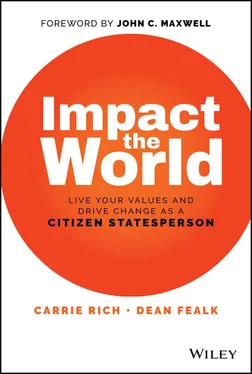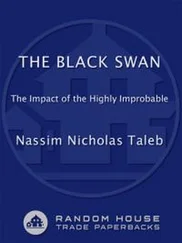5 Focus. A citizen statesperson's most valuable resources are their time and energy—both are limited. As a result, citizen statespeople focus on their objectives and commit wholeheartedly to their goals in order to “move the ball forward.” That doesn't mean citizen statespeople are incapable of doing multiple things at once; it does mean that they are capable of persevering through distractions and disruptions.
6 Leadership. Very few large‐scale issues can be solved or addressed by one person working in isolation. Instead, a citizen statesperson builds a coalition of like‐minded people to create change together. That process involves persuading, encouraging, and galvanizing others to comprise part of a larger solution. By exercising their own leadership, citizen statespeople advance and evolve society at large.
7 Scale. Making change in a person's local neighborhood or community is a great way to learn the basics of citizen statespersonship. Beyond that local focus, a citizen statesperson is also committed to taking their individual or group message to a larger audience to find how they can positively impact a greater number of people across borders or across stakeholder groups. That effort requires not only an understanding of how to broaden messages and scale change, but also a desire to shift from intimate local impact to extensive, far‐reaching transformations. It is not an easy journey and it is often uncomfortable—commitment to pursuing progress at scale is at the heart of citizen statespersonship.
8 Prioritization. Here's a hard truth: you can't do everything at once, and you can't help everyone at all times. We're all pulled and tugged in a variety of directions. Many causes and needs concurrently compete for our limited attention. A citizen statesperson recognizes that, if we are always chasing the squeakiest wheel, we'll never be able to move in the most efficient or effective way. Instead, a citizen statesperson envisions a path towards progress, and then takes deliberate actions that are necessary to reach their goals. There may be times when priorities must be reassessed or reordered as a result of changing circumstances, and a citizen statesperson shouldn't be so committed to an initial planned route as to be incapable of flexibility—even in the most challenging of times, citizen statespeople can course‐correct to plot and navigate a clear path forward.
9 Openness. Citizen statespeople believe that by engaging with problems and collaborating with others, they can find or create constructive solutions. In order to do that, they need to be open to new opportunities, new relationships, new communities, and new ideas—capable of interacting with people, places, and stories outside of their own lived experiences. That's why citizen statespeople are willing to leave their comfort zones, walk in multiple worlds and contexts, and parlay their understanding of real‐life conditions to make a difference.
10 Values. Values are at the core of everything a citizen statesperson does. They guide our behavior when no one is watching, and drive our commitment to progress. Values help determine how we want to achieve our goals, and help decide what kind of leader we want to be. Values create clarity of purpose, and keep us focused on the priorities that matter. Citizen statespeople position values at the center of the work that they do. Developing clear understanding of those values enables citizen statespeople to set a course that aligns with their views, ethics, and ideals.
These ten traits are not exhaustive, and do not constitute a magic elixir for creating progress out of thin air; rather, they are qualities that help an individual become an effective citizen statesperson. These traits help guide a citizen statesperson through risks, challenges, and hard decisions. They empower a citizen statesperson to build a network, to broaden their views, and to drive impact at a global level.
In short, people who have these traits have the power to change the world.
Becoming a Citizen Statesperson
What do you need to become a citizen statesperson?
Let's start with what you don't need. You don't need extraordinary wealth or resources. You don't need important social or political connections. You don't need an army of enthusiastic supporters dedicated to achieving your success.
What you do need is a commitment to create positive change, and the will to see it through .
Consider Reyhan Jamalova's story. In her small village of Baku, Azerbaijan, the schools didn't teach science, technology, engineering, and math. Girls were largely expected to be married by age 17 and to devote their lives to their families. But Reyhan was drawn to science—and when she received the highest score on the entrance exam to a competitive school in Buka at 12 years old, she left her family to study and pursue a better education.
Reyhan quickly discovered that she was interested not only in learning, but in action. In Azerbaijan, strong rains frequently cause temporary electrical outages. Reyhan wondered whether one challenge could be used to solve the other, and whether rainwater could be used to generate energy. For four months, she and a friend, assisted by mentors, ran calculations and developed a device capable of doing exactly that. With financial support from the Azerbaijani government, Reyhan built her first prototype.
Her goal was to present her product at the 2017 ClimateLaunchpad, the world's biggest green business competition. But in an accident, the generator shut down four days before the national final. In desperation, the team turned to two of the country's leading engineers, who told them that rebuilding the prototype in the time remaining was impossible. Undeterred, Reyhan and her team worked nonstop to re‐create their model—and won the “Audience Favorite Startup” award in the ClimateLaunchpad competition.
She was just 15 years old.
Since then, Reyhan secured new investors and considered broadening her work to additional countries like the Philippines, India, Malaysia, and Indonesia, where monsoons are frequent, taking her idea and her entrepreneurial drive to new heights.
Reyhan didn't start her journey with immense stores of resources or broad support networks. Rather, she tapped into her driving passion to make an impact, and determined to push through challenges to reach her goals.
We know that individuals play critical roles in starting movements, for good or for ill. We've seen these movements play out in the last few decades. A merchant sets himself on fire and ignites the Arab Spring. A schoolgirl from Pakistan survives an assassin's bullet and fights for the right for women in her society to access education. A young Swedish activist challenges world leaders to address climate change, spurring global protests by millions of young people demanding a better future.
Of course, not every individual‐led movement succeeds or crystalizes into positive impact. That's why there's more to being a citizen statesperson than being the symbol of a campaign or a liaison to global powers. To be a citizen statesperson, you must shape the dialogue and outcome according to your values. You must build social currency over time through social change efforts. And you must strive to play a meaningful and constructive role in helping to solve big problems in areas where traditional institutions have fallen short.
At their best, a political statesperson and a citizen statesperson do the same things; they bring people together, they forge solutions through diplomacy, and they push for agendas and social changes that benefit society. The difference is that a political statesperson is someone who represents his or her country or community in an appointed role, while a citizen statesperson is self‐appointed—spurred by civic responsibility to take on larger challenges and harness a force for good in the world.
Читать дальше












